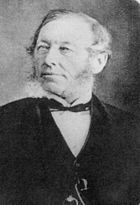Portal:Cheshire/Selected biography/16
Edmund Sharpe (31 October 1809 – 8 May 1877) was an architect, architectural historian, railway engineer and sanitary reformer, who was born in Knutsford.
As an architect, he predominantly designed churches, of which around forty survive; Cheshire examples include St Wilfrid's, Davenham, and Holy Trinity, Northwich. He pioneered the structural use of terracotta in the so-called "pot" churches, such as St Stephen and All Martyrs', Lever Bridge. He also developed railways in the north-west of England, and championed the construction of new sanitary works in Lancaster, where he practised in 1835–1851.
Sharpe achieved his greatest recognition as an architectural historian, publishing many articles, books and detailed architectural drawings. He criticised the widespread practice of restoring medieval churches, and devised a scheme for the classification of English Gothic architectural styles. In 1875, he was awarded the Royal Gold Medal of the Royal Institute of British Architects.

